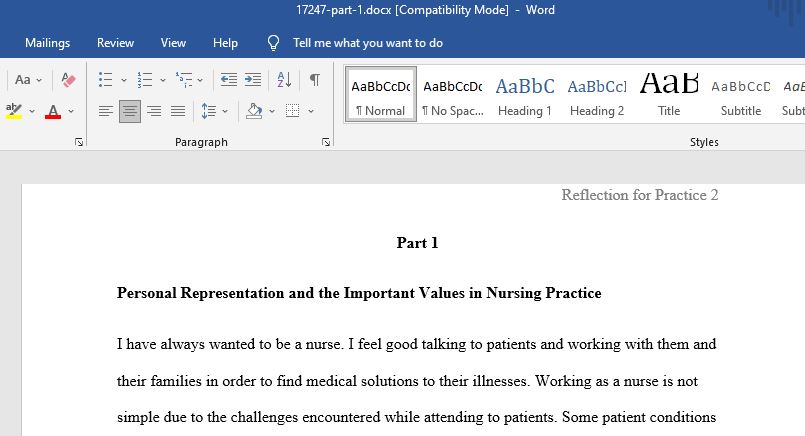Reflection for Practice
Project Details
Paper Topic : Assessment 2
Style : APA
Language Style : English (U.K.)
Type of Assignment : Assessment
Acedemic Level : Post Graduate Level
Number of Sources : 1
Order Instructions
Assessment 1 – Reflection: Detailed Instructions
The purpose of this assessment is to provide a reflection using a ‘ways of knowing’ approach, in
order to help you identify the empirical, aesthetic, ethical and personal factors that can influence
your practice.
To be able to undertake this reflection, you must have read Barbara Carper’s “Fundamental Patterns
of Knowing in Nursing” (available through the Moodle site and library ereadings) and undertake the
relevant learning activities in the Topics 1- 3 modules on the Moodle site including Topic 2: Ways
of Knowing.
Think about an event in your practice. It does not have to be a critical incident or a negative event. It
can be anything that happened that has stayed with you, something you felt good about or you feel you
did well. However it must be an event you were actively involved in rather than one you were
observing. In addition, regardless of it being a positive or negative event, the quality of the interactions
within including the outcome must have the potential to be improved upon. It can be related to any part
of your professional life, as a student, clinician, teacher etc. Refer to the discussion in the Moodle site
for advice about constitutes an event.
USING THE TEMPLATE PROVIDED (page 3 of this document) briefly describe this
event (300 words), then referring to Carper’s article, identify and analyse the ‘ways of
knowing’ within this even. Conclude by reflecting how this exercise has made
you think about your practice including how you could respond differently to change/improve
the interactions and outcome should a similar event occur again . Use the template
in page 3 to structure your reflection.
References: You may use any readings from the first four modules in the Moodle site to support
your argument in this assessment, and must include the Carper article. When referring to any of the
readings in your work, use in text citations as per the Harvard referencing system. All sources used
in the text must be listed in a reference list, formatted as per the Harvard system
http://uow.libguides.com/refcite/uowharvard.
3 | P a g e
Assessment 1 – Reflection: Template
1. Event description
Briefly explain the event you are going to analyse. Tell the reader what happened, who did it happen
to, what you did, how you felt, what you thought, what was the outcome.
2. Ways of Knowing
Analyse where Carper’s ways of knowing are located within the event. Identify their impact on how
the event unfolded including the event outcome. Use Carper’s ways of knowing as subheadings. Even
though it is possible that one form of knowledge dominated, you must show evidence of having
considered the impact of each way of knowing, and if it is not relevant, explain why not.
a) Empirics (identify and analyse the relevant science, medicine, policy, procedure etc.)
b) Esthetics (identify and analyse the elements of your practice that relate to your own
unique style of caring, intuition, empathy etc.) Think about how this is different to
empirics.
c) Personal (identify and analyse the ways in which you bought your personal self into this
event. How did your values, your ‘therapeutic use of self’ and relationships with others in
the event influence the way this event unfolded?)
d) Ethical (identify and analyse the ethical and political aspects of this event. Where the
patients rights upheld, if not why not, etc.)
3. Conclusion
Summarise your assignment by reflecting on how using ‘ways of knowing’ has helped you
understand your practice in new ways including how you could respond differently to
change/improve the interactions and outcome should a similar event occur again.
4. References
See note above in Detailed Instructions. Use in-text references to support your discussion and
a reference list in a separate page at the end of your essay. Use Harvard author, date as the
referencing system http://uow.libguides.com/refcite/uowharvard.
Answer preview:
Word: 600

